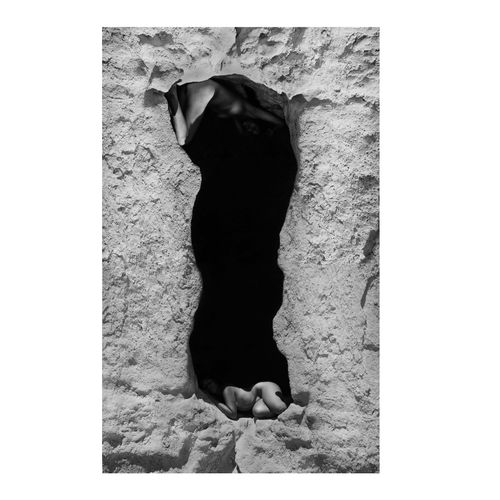In her new series MEDA, Ecuadorian-American artist Karen Miranda Rivadeneira captures naked bodies of women, their skins in close contact with the surface of rocks, grottos, dry hills, and ancient trees. These scenes, where darkness and light, heat and cool, tenderness and roughness, permanence and transience intersect, are the result of Rivadeneira’s attempt to seek a “voluntary, collaborative, and nonbinary” relation between humans and nature.
Karen Miranda Rivadeneira‘s new series MEDA consists of photographs, silkscreens, and paintings that are the results of her investigation on the primordial relationship between humans and the earth. For the photographs, Rivadeneira captures awe-inducing landscapes of Taos, New Mexico as well as those of her ancestral land in Ecuador. Created in 2018/2019, the series foresaw a world drastically changed by the pandemic where isolation and remoteness brought us back to the essentials and nature became solace. For Rivadeneira who grew up knowing indigenous cultures of the Americas, this has always been the environment in which she feels comfortable. In her words, “Deep in the mind of every living human, there are memories that can be traced back millions of years, and they can be activated by specific sounds, patterns, and images.”
MEDA is a word that came to Rivadeneira while she was looking up at the sky. Rooted in Amerindian mythology and storytelling, MEDA is a visual anthology of the first woman who fell from the sky and how the first land embedded in her body as a memory. In her photographs, Rivadeneira captures naked bodies of women, their skins in close contact with the surface of rocks, grottos, dry hills, and ancient trees. These scenes, where darkness and light, heat and cool, tenderness and roughness, permanence and transience intersect, are the result of Rivadeneira’s attempt to seek a “voluntary, collaborative, and nonbinary” relation between humans and nature. Using the pigments derived from soils, rocks, and plants, her paintings/silkscreen contemplate the land, our origins, and the unforeseeable future.


